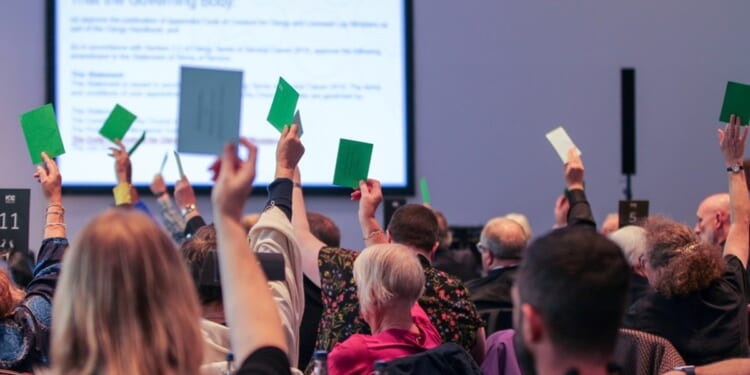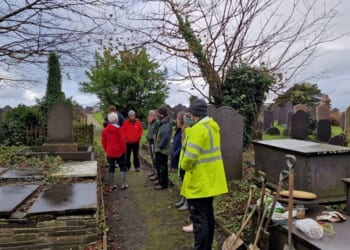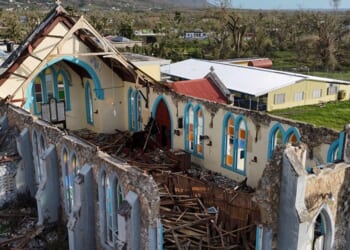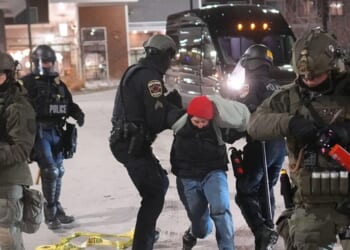A PRIVATE member’s motion on local ministry costs, brought by the Archdeacon of St Davids, the Ven. Mones Farah (St Davids), to the Governing Body of the Church in Wales last week, led to frank admissions of the ways in which dioceses were struggling financially.
The Bishop of Swansea & Brecon, the Rt Revd John Lomas, described his diocese as completely “hollowed out”.
Local churches now pay two-thirds of ministry costs themselves, where it used to be one third. The motion called on the Representative Body (RB) to consider restoring its contribution to pre-2005 levels, in the light of “Ministry Areas once established with hope, now finding themselves propping up deficits with reserves intended for mission”, Archdeacon Farah said. Seeds planted in 2005 had now “borne bitter fruit”.
The unintended consequences for the clergy were keenly felt: “Instead of focusing on mission, preaching, and pastoral care, many find themselves preoccupied with financial survival. Instead of energy for creativity, there is anxiety about decline. Morale drops, vocations weaken, congregations are stretched thin.”
Nigel Evans (St Davids), seconding the motion, said: “As a Governing Body, we now have to acknowledge that we are in crisis. We can’t hide it any more.” He said that, in his own parish, clergy and a small core of dedicated volunteers were “working just to keep the show on the road. We’re doing things on a shoestring, with peeling walls, and buckets to catch the leaks. . .
“If the situation I’ve just described is considered to be normal, and if this is what the reality of what life is now, . . . how can we expect our clergy to find the time and energy to be the ministers they want to be?”
He said that even what could be called the strong churches were struggling financially. “If we can investigate the possibility of more financial support to be given to the diocese from the centre, the results could well be transformative.”
The Dean of St Davids, the Very Revd Dr Sarah Rowland Jones (St Davids), said: “The Representative Body should not be afraid that it has to maximise its balance sheet and regard what it gives to dioceses, etc., as loss, because the loss of the balance sheet is actually investment in the common objective that we all have for mission and ministry.”
The Bishop of St Davids, the Rt Revd Dorrien Davies, said: “The time has come for a turning point. I think by reflecting in this way upon how we use our finances for the future and the sustainability of ministry, we will be walking towards renewal, revival, restoration, and resurrection.
“What did Churchill say? ‘Give us the tools that we will finish the job.’ When the bucket is empty, there’s very little to give. When I go around the diocese, rather than speak to me, as Bishop, about mission, about the word of the living God making a difference in people’s lives, they talk about ministry share. It’s disheartening. So, I think there is mileage in this today. I hope that in April we will have a deep and real conversation.”
The Bishop of St Asaph, the Rt Revd Gregory Cameron, praised the RB for its funding of the clergy during the pandemic, for taking over the totality of the cost of clergy pensions, “for the £1-million Transformation Fund, the £10-million Evangelism Fund, and the £100 million Church Growth Fund”. They worked extremely hard to support the life of the Church, he said.
“But I note that it is my people, in my diocese now, that are the first generation in 1500 years having to bear the cost of ministry. . . I see stress in the life of my churches. I see churches are using their reserves and telling me they may have three years before they run out of money, and cannot even begin to pay mission-area share. . .
“The motion is very modest. Can we just have a look at what the effects would be if we try to rebalance, try to increase our subsidies for the maintenance of ministry in our Province — and tell us the reasons, the tensions that are moving back and forth, that inform your decisions? Because, certainly, we’ve got to get the formula right.”
The Chair of the RB, Professor Medwin Hughes, fully supported the need to “put everything on the table. We need to undertake a full analysis of what it means to have a sustainable infrastructure for the Church in Wales, and to take into account all of the core concerns and issues that you have across the Province,” he said.
“There is a cost-value to each of them, and now is the time to consider in an appropriate manner what is the sustainable structure for the future of this Church. . . I hear the pain across the Province. Now is the time to have that conversation, and I support it.”
The Bishop of Swansea & Brecon, the Rt Revd John Lomas, said that he had always felt that there had been “a distrust in the Church in Wales as to whether the priests in the parish were pulling their fingers out, or whether they were sat with their feet up. . .
“I have sensed that, over the last 30-odd years or so, we have very different animals now that sit in this room. You would need your head felt if you thought you were going to come into the Church and do nothing all day. The people in our diocese are flat out. We are hollowed out.
“The entrepreneurial side of what we’ve done in Swansea & Brecon, and the people that we’ve brought in and the money we’ve been able to use, has meant that we’ve grown exponentially. In places, we’ve done fantastically well.
“But I [would plead for] the centre of our Church, the places where people will not be able to put together an entrepreneurial programme and get £1.2 million. I stand here today and plead for that, because they’re the backbone of everything that we do. We only survive as entrepreneurs because they are there supporting the Church.”
Susan Rivers (Llandaff) declared herself “the late chair of what my Archdeacon calls a ‘problem’ ministry area. I don’t have a leader, I don’t have a treasurer, and I have no money. We support our clergy as much as we can, but all my council are volunteers, and they do it from the goodness of their heart. Like me, they lie awake worrying ‘Can we raise the money?’
“And we can’t. . . We are so [ground down by] the buckets in the vestry, and the roof, and how we’re going to pay the utility bills, and how we’re going to pay our insurance that we haven’t got the energy to take forward the Kingdom of God. . . We’re relying on jumble sales now to get the money to run our ministry area. Something is wrong when we have to rely on the poor to keep us going.”
The Archdeacon of Bangor, the Ven. Robert Townsend (Bangor), had a ministry area that had seven churches and 11 churchyards to maintain, he said. “They’re trying to do it in the right way, in a carbon-neutral way, a looking-after-the- environment way; but it’s still going to cost them more than they will actually be paying in their parish share. So, I do think we need to look at everything and make sure we ask the question: Essentially, what can we do to free up our people and our volunteers for the mission of God’s Church in our country?”
The motion was carried overwhelmingly. It reads: “The Governing Body requests that the Representative Body present to Governing Body, for debate in April 2026, a financial and budgetary analysis of the effect of restoring the RB’s contribution towards local ministry costs to the levels prior to the 2005 Representative Body Review (the Rowe-Beddoe Report), whilst maintaining Church Growth Fund funding at present levels.”

















